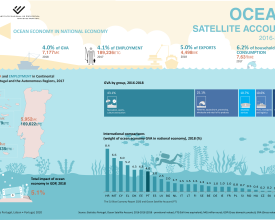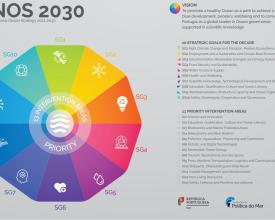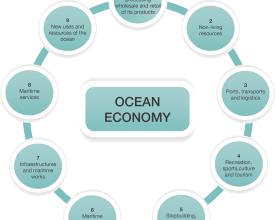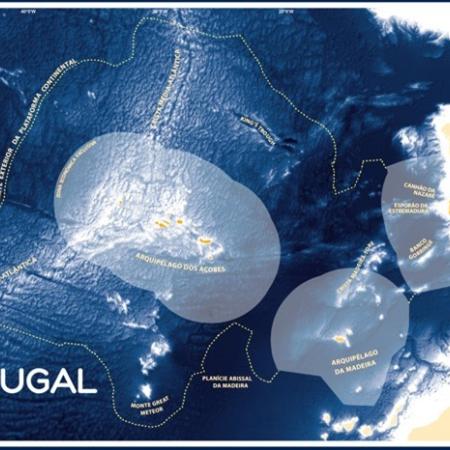
Cuenta Satélite del Océano Portugués
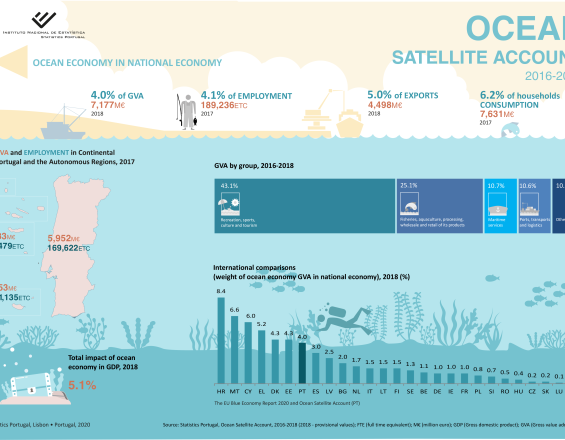
Las cuentas satélite pretenden aumentar la capacidad de observación de determinados fenómenos. En Statistics Portugal suelen desarrollarse en asociación, buscando complementar los métodos estadísticos con los conocimientos específicos disponibles en otras instituciones. La Cuenta Satélite del Océano (CSO) portuguesa se desarrolló en colaboración con la Dirección General de Política Marítima (DGPM) del Ministerio del Mar.
La OSA portuguesa se basa en el marco conceptual de las Cuentas Nacionales portuguesas y se considera un instrumento adecuado para estimar la importancia macroeconómica relativa de la Economía Oceánica en la Economía portuguesa. También sirve de apoyo a la toma de decisiones y al seguimiento de las políticas nacionales, en particular el pilar económico de la Estrategia Oceánica Nacional.
El OSA se considera una herramienta de información útil y oportuna. Sin embargo, se reconoce que no cubre toda la información económica relevante, en particular el valor de los recursos naturales y de la sostenibilidad del crecimiento económico.
Contexto
Défis à relever
El OSA portugués aborda los retos de:
- Medir la relevancia de la economía del mar/océano
- Apoyar la toma de decisiones relativas a la coordinación de las políticas públicas para el océano
- Seguimiento de la Estrategia Oceánica Nacional 2013-2020 (NOS 2013-2020) y de la Estrategia Oceánica Nacional 2021-2030 (NOS 2021-2030) en su componente económica, dando apoyo a la Comisión Interministerial de Asuntos Marítimos (ICMA). También proporciona información fiable y adecuada para Portugal en el contexto de la Política Marítima Integrada (PMI) y otros procesos en los que los datos para la Economía Oceánica son decisivos.
Ubicación
Procesar
Resumen del proceso
El Building Block 1 (lógica de la cadena de valor) es la base de nuestro enfoque, mientras que el Building Block 2 se centra en el uso de la herramienta. Así pues, los dos módulos se complementan mutuamente.
Bloques de construcción
Lógica de la cadena de valor
El ámbito de la Economía Oceánica, considerado en la Cuenta Satélite del Océano (CSO) portuguesa, agrega las actividades en dos grandes áreas: "actividades establecidas" y "actividades emergentes" que, a su vez, se dividen en grupos. Considera nueve grupos, ocho de los cuales corresponden a actividades establecidas (grupos 1 a 8). El último grupo (grupo 9) incluye nuevos usos y recursos del océano, que congrega actividades emergentes (véase la figura). El criterio adoptado para la clasificación de las actividades económicas como establecidas o emergentes obedeció a la lógica internacional de nivel de madurez de los mercados, es decir, lo que se sigue en la UE, en el estudio "Crecimiento Azul" a efectos de comparaciones internacionales.
En general, adoptamos una lógica de cadena de valor teniendo en cuenta, entre otras cosas, el nivel de desagregación industrial permitido por el Sistema Estadístico Nacional. Dada esta restricción, la opción metodológica fue considerar los Servicios Marítimos y de Equipos Marinos como grupos independientes, incluyendo actividades económicas cruzadas en otros grupos.
Factores facilitadores
- Sistemas estadísticos maduros con datos detallados y de calidad
- Amplio debate con varias partes interesadas sobre los conceptos, definiciones y agregaciones de la cuenta
- Muy buena articulación entre entidades
Lección aprendida
- Actividad lenta en el primer ejercicio debido a su carácter pionero (ejercicio piloto)
- Dificultad para obtener información sobre actividades emergentes
- Los resultados compensan el esfuerzo: esta organización de los datos permitió ilustrar la heterogeneidad de los distintos grupos (dinámica, productividad, resiliencia, etc.)
Comprender el impacto de las actividades oceánicas en la economía nacional
El principal objetivo de la Cuenta Satélite del Océano (CSO) portuguesa es proporcionar un sistema de información económica sobre el mar. La OSE se consideró la herramienta más adecuada para estimar el tamaño y la importancia de la economía oceánica para la economía portuguesa y para obtener información sobre la estructura de las actividades de producción relacionadas con el océano.
El OSA privilegió el tratamiento simultáneo de la oferta y la demanda. Se obtuvo información, no sólo para la cuenta de producción (producción a precios básicos, consumos intermedios, Valor Añadido Bruto - VAB), sino también para variables económicas relevantes como el consumo de los hogares y de las administraciones públicas, las importaciones y las exportaciones. De este modo, fue posible estimar la contribución del "Océano" al VAB y al empleo nacional. Además, se realizó una estimación del empleo remunerado y no remunerado, no sólo por su relevancia, sino también para permitir evaluar la verosimilitud de los resultados.
Aplicando el Sistema Integrado de Matrices Simétricas Input-Output a los principales resultados, fue posible determinar, además de los efectos directos, el efecto indirecto de las actividades de la Economía de los Océanos sobre la economía nacional.
La compilación de OSA a nivel NUTS I permitió disponer de información para Azores y Madeira (islas), ilustrando las diferencias regionales, es decir, los distintos patrones de producción.
Factores facilitadores
- Sistemas estadísticos maduros con datos detallados y de calidad.
- Muy buena articulación entre entidades.
Lección aprendida
- Nuevos retos técnicos y de coherencia en el segundo ejercicio, relativo a la desagregación NUTS I.
- Detallar la información a nivel regional permite mejorar la calidad de los datos y la solidez de los conceptos, sobre todo en lo que respecta al turismo costero. Algunos conceptos definidos para el nivel nacional no son adecuados para el nivel regional.
Impactos
Existe un claro reconocimiento de la importancia de la Cuenta Satélite del Océano portuguesa. Los datos proporcionados
- Apoya la toma de decisiones y la formulación de políticas relacionadas con el mar
- Apoya el seguimiento de la Estrategia Oceánica Nacional 2013-2020 (NOS 20132020) en su componente económica
- Apoya a la Comisión Interministerial de Asuntos Marítimos (ICMA)
- Proporciona información en el contexto de la Política Marítima Integrada (PMI)
- Proporciona información sobre el contexto socioeconómico de la Directiva Marco sobre la Estrategia Marina (MSFD), así como análisis económico y social en el núcleo del Convenio OSPAR para la Protección del Medio Marino del Atlántico Nordeste
- Apoya la definición de la Estrategia Oceánica Nacional 2021-2030, teniendo en cuenta los resultados del seguimiento anterior (NOS20132020), y tendrá en cuenta los resultados de las futuras ediciones de la SAS a efectos de seguimiento
- Apoya otros procesos en los que los datos para la Economía del Mar son decisivos, incluso para la toma de decisiones privadas o para la sensibilización del público.
Beneficiarios
- Dirección General de Política Marítima (DGPM), Ministerio del Mar
- Regiones autónomas (Azores y Madeira)
- Sectores marítimos
- Academia
- Público en general
- Municipios
Objetivos de Desarrollo Sostenible
Historia

Portugal está situado en el suroeste de Europa, en la confluencia de tres placas tectónicas: la euroasiática y la nubia, al este, y la norteamericana, al oeste. Es un país tradicionalmente volcado hacia el océano y sus recursos, cuyas gentes miran culturalmente a ultramar: África al Sur, Norteamérica y Sudamérica al Oeste. Es uno de los países europeos con mayor litoral y extensión del Proyecto de Plataforma Continental, en curso en las Naciones Unidas. Esa es nuestra principal inspiración para ser pioneros en el desarrollo de una Cuenta Satélite del Océano (OSA). ¿Cómo podemos preservar nuestros recursos oceánicos y desarrollar nuestra economía oceánica sin conocer su importancia?
La OSA representó, en promedio, el 3,9% del Valor Añadido Bruto (VAB) en el trienio 2016-2018 y el 4,0% del empleo (Equivalente a Tiempo Completo - ETC) de la economía portuguesa, en el período 2016-2017. El desempeño de las actividades económicas consideradas en el OSA estuvo por encima del conjunto de la economía nacional: entre 2016 y 2018, el VAB creció un 18,5% (el VAB nacional aumentó un 9,6%) y, entre 2016 y 2017, el empleo creció un 8,3% (en la economía nacional la variación fue del 3,4% en el mismo período).
También están disponibles los resultados de las regiones autónomas (Azores y Madeira). En 2016-2017, el 10,7% del VAB de la economía oceánica se generó en estas regiones, 6,1 puntos porcentuales más que el peso relativo que estas regiones tienen globalmente en el VAB nacional.
Aplicando el Sistema Integrado de Matrices Input-Output Simétricas de 2017, que permite obtener una imagen ampliada de las relaciones intersectoriales de la economía permitiendo captar los efectos indirectos, se estima que, en 2018, el impacto directo e indirecto de la economía oceánica sobre la economía nacional se ha traducido en un 5,4% del VAB y un 5,1% del Producto Interior Bruto (PIB).
